In 2013 we honored:
Clarence Kahlig II (who went from a car salesman to owning seven car dealerships)
Sylvester Perez (overcoming low expectations & opening doors of opportunity for Texas students)
Henry Cisneros (mayor of San Antonio, Secretary of Housing & Urban Development)
JoAnn Ezquerra Boone (following a strong work ethic to success)
Sam Medina (from migrant worker to district judge; serving on the bench and in the pulpit)
The 1956 Laredo Martin Tigers (Texas Class 4A basketball champions).
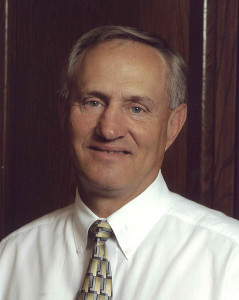
BUSINESS
Clarence Kahlig II
Owner of Seven Auto Dealerships
A poor kid with athletic talent can work hard, excel and count on success on the field to get him or her through college. Clarence Kahlig II did well at Central Catholic, and earned a football scholarship at Texas A & I. He played in his freshman year, and was positioned for a starting role in the Javelinas lineup for his sophomore year. Read More
Then, two weeks before the season started, he pulled a ligament in his lower back. They tried to rehabilitate him, but by mid-semester, the coach was talking about dropping him to a half scholarship. “I just didn’t have the money to make it on a half scholarship,” Kahlig said. “I knew I would have to focus on my academics.”
Kahlig had assets that superseded his athletic prowess: a strong work ethic, smart parents and a good family. His dad was a great role model, working hard and providing for his family. His mom – the second youngest of 10 children – was very thrifty.
“I grew up in an $8,000 wood frame home that housed my parents and five children. My dad grew up on a dry dirt farm near Westphalia. He was drafted into the military, and became the only one of three sons to leave the farm forever. He met my mom at La Villita when he was stationed here. He grew up working hard and he is a walking saint. He attends Mass almost every day, he grew up working hard and was a great model as he provided for our family. He had a hard discipline for us, but his example has kind of trickled down to me,” Kahlig said.
The former Elvira Flores, a direct descendent of José Antonio Navarro, gave Clarence Kahlig deep roots in South Side San Antonio. “I’m half German and half Hispanic. I remember my grandmother taking me to St. Henry’s when I was 8 or 9 years old to play bingo. She would give me a paper cup with french fries,” he said.
Kahlig’s mom also taught him how to manage money. “At an early age, I was mowing lawns – we put an ad in the Northside Recorder. I would cut grass and give half the money to my mother – she taught me that you can live on half of anything; if you could live on half of your paycheck, you could make it. She used the money to pay for my tuition at Central Catholic.”
It was that kind of working and saving that put Clarence through college after he got injured. He transferred to the University of Texas at Austin. As a married student, he needed housing, so he got a job at an apartment complex where he traded management – showing apartments, processing leases, collecting rent – for an apartment. He worked at Stuckey’s on the highway every weekend, pumping gas and checking oil for $20 per weekend. And he borrowed $2,500 a year from United Student Aid. He did what he had to do, and graduated with a Bachelor’s Degree in Business Administration.
“I got a job with the Internal Revenue Service as a Tax Examiner, earning $680 a month. The job was from January through September, and then there was a 90-day break. As the break came up, I decided to try the car business on a whim. I liked it, I had a pretty good month the second month I was in the business. I never returned to Internal Revenue,” he said.
His mother liked his Internal Revenue job and was not very fond of his decision to leave it. “Your dad and I are proud of you, we have worked hard to help you, and now you’re going to be a car salesman?” she asked him. Clarence said she has gotten over it by now. “She gets a new demonstrator every six months,” he said. “I think she’s pretty happy with me now.”
Clarence worked his way up, serving North Park Lincoln Mercury as a Used Car Manager, then New Car Manager, then Sales Manager and finally buying the dealership. He now owns all or part of seven dealerships, serving as President or Managing Partner of all of them. His dealerships regularly win awards.
In addition to his parents’ example, Clarence credits the Marianist Brothers at Central Catholic for helping shape his core values. “The way the brothers live – they don’t ever ask for money, they just do their job and it gives you a very humble sense of roots,” he said. He has recognized their contribution in a very significant way – he donated a 6.8 acre baseball field with a fully built stadium and practice facilities for his alma mater.
“The people you look up to as mentors can really show you the way,” he said. When the chips were down, Clarence Kahlig took what he had and made it work.
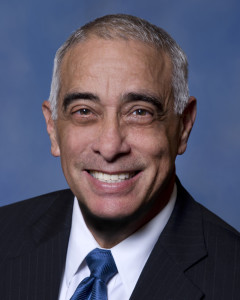
EDUCATION
Sylvester Perez
Overcoming low expectations to opening doors of opportunity for Texas students
Sylvester Perez did not have a clue about college plans until he started to excel on the baseball diamond at Harlandale High School. His mother was orphaned at the age of 8, and only completed the first grade. His father had an eighth grade education. Read More
“Work ethics were always stressed, but education wasn’t necessarily emphasized beyond high school. I was far from being pampered in my youth, and my parents definitely molded who I am. Simply stated, I navigated myself through those years, (and achieved) far from stellar academic accomplishments. I chose the lesser challenging courses, and was not motivated to go beyond the minimum. High expectations were something unknown beyond the athletic field,” Dr. Perez said.
His coaches saw greater potential, and told him so. Pro scouts and college coaches responded to his performance on the field with interest, and he started to see a brighter future.
“I credit high school coaches for setting expectations, teaching values and I credit high school coaches for setting expectations, teaching values and instilling discipline that seemed to be always needed at home and school. There are probably certain labels that perhaps would apply to me in today’s educational environment,” he said.
As superintendent of five different school districts in Texas, Dr. Perez has made it his personal mission to raise expectations and inspire students to plan for college from their first day of school. Dr. Perez has earned a reputation for putting students first and implementing innovative college-bound programs in every district, every community he has served.
There was a wobbly and treacherous bridge to cross between Sylvester’s high school and college careers. Along came another cadre of dedicated educators. “The high school experience did not prepare me for college. I never planned to attend college until pro and college baseball scouts began to show an interest in me. After struggling academically at Wharton County Jr. College, I attended St. Philip’s College in San Antonio, and excelled in the classroom. The teaching staff were committed to my learning and success. I still credit them for making them believe in my potential and opening the gates into higher education,” Dr. Perez said.
From St. Phillip’s, Dr. Perez went to New Mexico Highlands University, and continued to hit and field. He earned a Bachelor’s Degree in 1972, then a Master’s in 1976. His baseball feats eventually earned placement as an NAIA Baseball All-American. Later, he was inducted into the New Mexico Highlands Athletic Hall of Fame and as a Harlandale ISD Hall of Fame.
After college, Dr. Perez served as a coach, teacher, athletic director, assistant principal and principal. His graduate work was “a marathon” compared to the earlier years, he says, and he earned a mid-management degree and his Ph.D. at Texas A&I. From there, he began directing entire districts. He has served as superintendent of School Districts in Mathis, Clint, San Marcos and Midland. He came out of retirement to serve San Antonio ISD as an interim superintendent, and was hired as the permanent superintendent in May 2013.
In addition to his administrative work, Dr. Perez has shared his experience and expertise to other academics moving from the classroom to upper management. Dr. Perez has worked as an adjunct instructor at various institutions, including the University of Texas at Austin’s Cooperative Superintendent Program, Texas A&M University-Kingsville and at the University of Texas of the Permian Basin.
Throughout his career, Dr. Perez recognizes guidance and encouragement from many mentors, but his consistent “support group” has been his wife, Dee Dee (“my biggest fan, cheerleader, travel agent, and much more”) and his three sons, Michael, Marc and Steven.
In the early years of his education, without much prospect, Sylvester Perez had the good sense to just keep going. “I overcame many challenges by ‘sticking it out, and sucking it up,’” he says, and when opportunity opened the door, he stepped through. Recognizing the blessing that higher education gave him, he has spent 38 years giving back, opening doors of opportunity for thousands of Texas students.
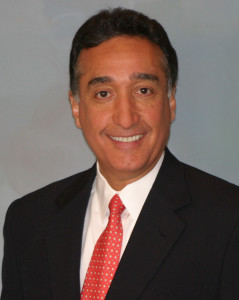
PUBLIC SERVICE
Henry Cisneros
Mayor of San Antonio (1981-89)
Secretary of Housing and Urban Development (1993-97)
While far too many smart, capable students are overlooked and under-estimated, Henry Cisneros encountered a significant challenge in his life when he was recognized for being smarter than his age. As a student at Little Flower School, Henry was skipped two grades – from third to fifth. For the rest of his academic career, he was psychologically and physically two years younger than his classmates. Read More
That meant he entered Central Catholic high school at about 12 years old, and then Texas A&M at the age of 16. “At a critical point of adolescence where you are constantly comparing yourself, competing, and I had to mature quickly which was something of a challenge. stretch beyond my capabilities in everything from sports to ROTC to academic performance to dating and socializing,” Cisneros said.
“Brother Martin McMurtry sort of shook the shyness out of me by putting me in front of the classroom and making me recite poetry, readings, extemporaneous speeches. He took a shy kid from the Westside and showed him that he had some facility in this regard. I’ve kind of never been the same,” Henry said.
Things seemed to change a lot when Cisneros entered Texas A&M in 1964.
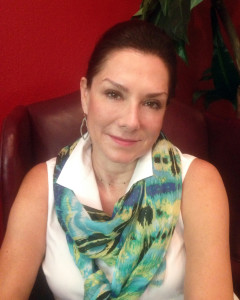
SPECIAL RECOGNITION
JoAnn Ezquerra Boone
Following a Strong Work Ethic to Success
If you can master language, understand business and love people, you will succeed. JoAnn Boone mastered two languages – English and Spanish – at an early age, attending Little Flower School. Her mother, Tomasa Ezquerra, was widowed at a young age with six children to raise. The only way a family works like that is when everyone in the family works hard. “My mother persevered to great lengths with a great work ethic that we all learned and benefitted from,” Ms. Boone said. Read More
Challenged by the cost of higher education, JoAnn made good use of all the financial aid she could round up, taking core classes at San Antonio College and matriculating at the University of Texas at San Antonio.
Ms. Boone graduated with a lot of energy and a powerful ability with languages. She taught at the Berlitz School of Languages, teaching intermediate and advanced Spanish to area elementary teachers and administrators for their bilingual certification requirements. She then became Reservations Supervisor for Southwest and Tejas Airlines, gaining valuable expertise in customer service.
From airlines, JoAnn went into publishing. She served as Regional Sales Manager and Production Supervisor for Ventana Publications, responsible for managing sales representatives of the Spanish-language newspaper insert in five Texas markets. She also successfully negotiated for distribution outlets in Mexico and journeyed to Mexico on a monthly basis to coordinate distribution and insure the quality of the printing process.
Ms. Boone brought her skills and experience to the River Walk in 1983, marketing the River Walk Association’s Showboat magazine and promotions. She maintained her downtown contacts through the years when she was raising her children Jack and Kate, serving as chair of the search committee for the Children’s Museum of San Antonio, which opened its doors in 1995. She also operated JEB Translation Services, a simultaneous translating service for attorneys, over the course of fifteen years.
In 2002, JoAnn became president and CEO of Rio San Antonio Cruises, negotiating a 10-year renewal contract with the City of San Antonio in 2005. Rio San Antonio Cruises has been recognized as the city’s most lucrative contract relationship. For our constant stream of tourists, the River Walk “barges” are a once-in-a-lifetime experience. Rio San Antonio’s charming and skillful boat captains are the face of the city for our visitors.
As she leads customer service training in the River Walk business, JoAnn said she has been inspired by her close friend (and National Hispanic Heritage Hall of Honor member) Rosemary Kowalski.
“Rosemary, like my mother, could have given up on many an occasion of negativity in both her personal and business life, but despite all that, became the Queen of Excellence in Service that we know her to be,” Ms. Boone said. It’s that work ethic – you keep going and never give up – that drives success.
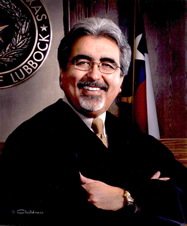
PUBLIC SERVICE
Sam Medina
From Migrant Worker to District Judge, Serving on the Bench and in the Pulpit
Sam Medina grew up on the move, migrating from field to field with a family of eight piled into a two-door car. He is an alumnus of countless schools, because his family understood that the only way any of them could ever escape the migrant life would be through education. Sam has one report card from a school that shows he was there for exactly 8 days of classes. Read More
He said that he was always the “new kid,” everywhere he went. So, he would hide behind his books. “It was difficult to make friends or participate in activities while in school. I learned to be quiet, not ask questions, not make requests, and basically become invisible. Yet, it gave me an opportunity to concentrate on what was being taught.”
In the sixth grade, Sam Medina, his parents and siblings received some valuable feedback on their efforts. “Mrs. Brown taught me the value of accomplishment when she told me at the end of my 6th grade year that ‘you are our highest ranking 6th grade boy and we will be recognizing you in an assembly. Please ask your family to come.’ What that did for me and for my family cannot be quantified or measured.”
After years of following the harvests in a triangle that reached from Texas to Michigan to Florida, the Medina family finally settled in Crosbyton, a suburb of Lubbock. Sam Medina graduated from high school, attended Texas Tech and taught English at Lubbock High School before returning to Tech and earning his law degree.
Judge Medina has been very active in his church. He is a bi-occupational pastor of Alliance Baptist Church, and he has served as president of the Mexican Baptist Convention of Texas, vice-president of the Baptist General Convention of Texas, and Chairman of the Committee of Committees for the Southern Baptist Convention.
“He stopped digging and said, ‘We’ve just sent someone to the moon and you’re worried about money for college.’ Then he went back to digging. It was his way of telling me to never give up on my dreams,” Judge Medina said.
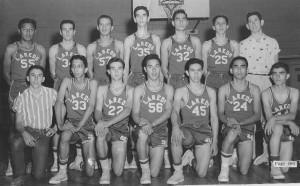
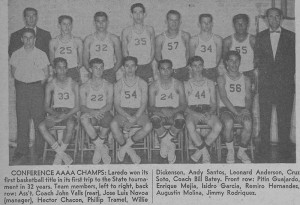
ATHLETICS
Laredo Martin Tigers
1956 Class 4A Texas Basketball Champions
Sportswriters are like weather forecasters – they compile a lot of facts, then make a pretty good guess about the outcome. Sometimes, however, the weather takes an unexpected turn. On May 3, 1956, in Gregory Gym on the campus of The University of Texas, a team of short, scrappy players from Laredo presented that unexpected turn to North Dallas High School, beating the taller, big-city team 65-54. Read More
North Dallas was stunned, the sportswriters – who had written earlier in the season that no small town, short team could win in 4A basketball – were shocked. But it was no surprise to Houston Milby or Corpus Christi Miller, two other favorites who were bested by the Laredo Martin Tigers on their way to the state championship.
Coach Batey had spent years training them to be champions – they had made it to the state tournament in 1955, but lost in the later rounds. They had played together since their days at the Laredo Boys Club on the corner of San Eduardo and Moctezuma – they were more than a team, they were a family.

